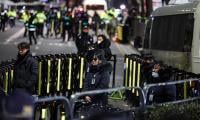KARACHI: The business community on Thursday rejected the government’s decision to raise petrol prices by 13.55 rupees per liter, saying it would hurt the common man and the industrial sector.
Iftikhar Ahmed Sheikh, president of the Karachi Chamber of Commerce and Industry, said in a statement that the hike was unexpected and unjustified, as the dollar had stabilized and inflation had eased.
"A hike somewhere between Rs5 to Rs9 per liter was expected as prices of petroleum products have increased in the international market, but it was highly unfair to blatantly raise petrol price locally by Rs13.55 per liter, which would terribly hit all segments of society and intensify the hardships, particularly for the general public, besides terribly affecting the industrial production as the cost of doing business would obviously go up," Sheikh said.
The KCCI President said that when the rupee had attained some stability nowadays, this hike in petroleum price was not making any sense, which, if necessary, should have been raised by a minimum Rs5 per liter with a view to passing on minimum impact on the poor masses who were excessively overburdened in the ongoing era of inflation.
“The government has been charging Rs60 per liter petroleum levy, which is the maximum permissible limit under the relevant law. To minimize the hardships, the government should have reduced its petroleum levy to some extent for dealing with the price difference in local and international market, which unfortunately was not done,” he said.
"The caretaker government continues to take ruthless decisions in the form of raising petrol, gas and electricity prices to squeeze the public and the industries, which was totally unacceptable."
Sheikh said the business community was also expecting a cut in the key policy rate by at least 100 basis points to send a positive signal, but unfortunately, it has also been kept unchanged at 22 percent despite the State Bank’s claim about inflation falling down in the range of 23 to 25 percent.
He opined that keeping in view the economic crisis being faced by the country, the government had to take harsh steps in order to generate the required revenue for overcoming expenditures and fulfilling international commitments, but instead of taking these steps back-to-back, they should devise some kind of an effective strategy to ensure some sigh of relief to the masses and the industry, who will not be able to bear the brunt caused by consecutive price hikes.
Sheikh said instead of curtailing the government's unnecessary expenditures, the poor public and the industries were constantly being penalized, that had resulted in bringing down the industrial production and exports, which had brought the economy at a point where it had no other option but to depend on foreign loans and assistance to stay afloat.
“There is a need to implement structural reforms, curb unproductive expenditures, expand the tax base, privatize loss-making institutions and foster public-private partnerships to stimulate sustainable growth to save the country from plunging into further disaster.”
He stressed that the emerging situation had to be efficiently addressed and handled very carefully, otherwise, the rising petroleum, gas and electricity prices will continue to increase the cost of doing business, which would terribly affect the industrial performance, raise unemployment and open the floodgate of inflation, particularly for the middle and lower segments of the society, besides making the poor poorer due to unbearable inflation.
He said that the increase in petroleum prices will also bring a negative effect on transportation charges of import-exports cargo, electricity fuel adjustment charges, maintenance cost and other expenditures, which would collectively affect the cost of finished goods and make the manufacturing & exports sectors uncompetitive in the international market.
Johar Ali Qandhari, president of the Korangi Association of Trade and Industry (KATI) also voiced strong opposition to increase in petroleum product prices, asserting that the rise of Rs13.55 per liter in petrol prices, despite a stable dollar, is unjust.
Qandhari contended that the local price surge far exceeds the differences observed in global markets, forecasting that this decision will unleash a storm of inflation, further burdening the common people.
People walk out of a branch of Mashreq bank at Dubai Internet City on Feb. 5, 2012. — Reuters/FileKARACHI: Mashreq...
Jazz headquarters are seen in this file photo. — X@Jazz/FileLAHORE: Veon Group has invested $15 million in Mobilink...
A representational image of gold jewellery. — AFP/FileKARACHI: Gold prices rose by Rs1,100 per tola on Thursday in...
A rainbow is seen over apartments in Wandsworth on the River Thames as UK house prices continue to fall, in London,...
Shoppers browse merchandise in a shopping mall on Orchard Road, in Singapore December 23, 2022. — ReutersSINGAPORE:...
Apple Iphone can be seen in this image. — Unsplash/FileBEIJING: Apple is offering rare discounts of up to 500 yuan ...







